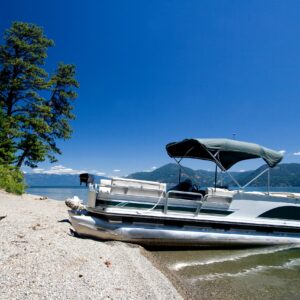Tips to Prevent Aluminum Boat Corrosion in Saltwater

Tips to Prevent Aluminum Boat Corrosion in Saltwater
No one said boating was a cheap hobby, but that doesn’t mean boat owners want to shell out tens of thousands of dollars in repairs and replacement – especially on problems that are preventable. Corrosion, especially aluminum boat corrosion, is one of those.
Few feelings are as freeing as a warm saltwater breeze across your skin while you’re skimming the glittering open sea in a boat of your very own. It’s no wonder recreational boating and fishing lead the nation’s $700 billion outdoor recreation economy, according to the U.S. Department of Commerce’s Bureau of Economic Analysis.
Today, the average price of a new boat is around $42,000. For a used model, you’ll be hard-pressed to find anything decent and durable under $10,000. Price varies depending on the size and all the bells and whistles. Expect yearly maintenance to hover somewhere around 10% of the sale cost – not including insurance, gas and storage. With all that, you want a vessel that’s going to be seaworthy for many sunsets to come. Prioritizing aluminum boat corrosion prevention with vapor corrosion inhibitors during storage can help ensure that.
Benefits of an Aluminum Boat
Aluminum is one of the two most popular materials for boat manufacturers (the other being fiberglass) – and it’s not hard to see why.
Some benefits of an aluminum boat:
- Affordable. They tend to be less expensive – sometimes substantially so – compared to fiberglass. Maintenance and repair costs are usually lower also.
- Lightweight. They typically require less power and fuel to run effectively, so operating costs are often lower. They’re also easier to load and launch at boat ramps, move off sandbars and tow behind your vehicle.
- Hull integrity. Aluminum tends to be more resistant to impact, which means it’s less susceptible to hull damage – even in choppy waters. Another upside of this is aluminum boats tend to maintain their resale value better than fiberglass boats.
- Eco-friendly. The manufacturing process of creating an aluminum boat tends to involve fewer resources and smaller supply chains. It’s also recyclable.
Aluminum is also generally less vulnerable to corrosion than other metals when exposed to saltwater. But make no mistake: It can and will corrode. Proper cleaning, drying and storage – with volatile corrosion inhibitors (VCI) – can go a long way toward preventing aluminum boat corrosion. 
The Risk You Run With Aluminum Boat Corrosion
If you’ve owned a boat for any length of time, you’ve probably had to replace your anodes a time or two when they got corroded. Less known is the fact that rust and corrosion can creep in completely unnoticed and cause major damage throughout. You may not even realize until it’s too late that the metal mast and rigging has degraded, the wires are destroyed, the valves are eroded and the steering systems are starting to fail – all because of corrosion.
Some areas of an aluminum boat where corrosion can be especially problematic:
- The green wire. Sometimes referred to as the grounding wire, this is what protects you from being shocked by electricity if there’s a short circuit. If it becomes corroded, it’s less likely to be effective.
- Fuel shut-off valve. A rusted fuel shut-off valve is a recipe for disaster – fuel leak and potential explosion.
- Shift and throttle cables. If you are noticing that its gradually becoming tougher to shift gears, corrosion could be the cause. You risk loss of control and possibly a crash. Take it seriously and get it checked out immediately.
- Navigation light sensor. This seems like such a tiny thing, it’s easy to overlook. But this lightbulb is what allows other boats to see you moving through the water at night. It’s a critical safety feature. If it becomes corroded and fails, you’re at higher risk of a nighttime collision.
It’s a good idea to check these areas regularly.
Beyond that, Zerust makes high-performance VCI vapor capsules for aluminum boats. The capsules release a non-toxic vapor that settles on metal surfaces within six feet of an enclosed storage space, providing protection from the chemical processes that trigger rust and other forms of boat corrosion.
If you have questions about the exact size or number of capsules needed, reach out directly to our knowledgeable rust prevention experts for more insight!
Contact Zerust for information on VCI products to help with boat rust prevention by emailing us or calling (330) 405-1965.
Additional Resources:
How to Protect Aluminum Boats in Saltwater, Nov. 7, 2017, By David Seidman, Boating Magazine
More Blog Entries:
Winter Boat Storage That Reduces Rust and Corrosion Risk, Oct. 18, 2023, Boat Corrosion Prevention Blog




